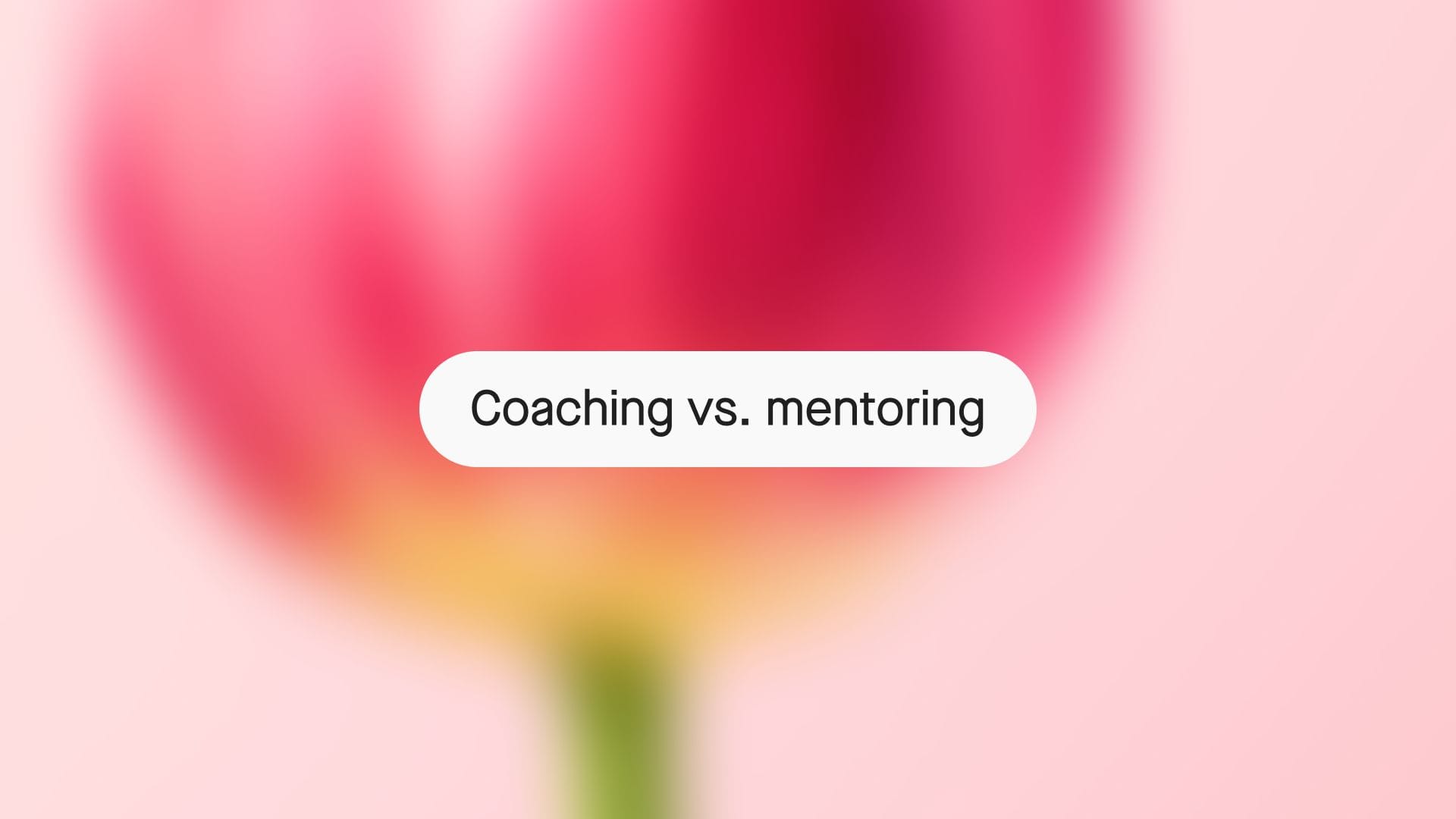Coaching is short-term, goal-driven, and easier to sell as a results-based offer. Mentoring is long-term, relationship-based, and ideal for building loyal communities. Here’s how to choose which one fits your business best.
Key takeaways
- Coaching delivers structured, short-term results through frameworks, while mentoring offers long-term, relationship-driven growth through shared experience.
- Choose coaching when clients need specific measurable outcomes; choose mentoring when they want guidance, networking, and access to your expertise.
- Combining coaching and mentoring in a hybrid model delivers both immediate wins and lasting value for maximum client impact.
Coaching and mentoring get thrown around like they mean the same thing.
They don’t.
If you’re building an online business around your expertise, the difference between coaching and mentoring matters.
Coaching is structured, short-term, and built around results. Mentoring is long-term, relationship-driven, and built around experience.
One sells a clear transformation: “I’ll help you make your first $5k online.”
The other sells access: “Learn directly from someone who’s already done it.”
Both can make you money, but the trick is knowing which one fits your goals (and your audience) before you build your offer.
Let’s break it down.
Are coaching and mentoring really different?
Yes, coaching and mentoring are different offers. Here’s a quick overview:
| Mentoring | Coaching | |
|---|---|---|
| Purpose | Holistic growth | Targeted results |
| Duration | Long-term | Short-term |
| Main Goal | Connection & guidance | Skill-building & transformation |
| Structure | Experience-based | Framework-based |
| Initiative | Mentee-led | Coach-led |
| Cost | Often free or low-cost | Paid service |
| Expertise | Deep, niche experience | Broad, teachable systems |
Let's get into the full breakdown.
Coaching vs mentoring: What's the difference between the two?
The core difference: Coaches focus on skills, strategy and results. Mentors focus on experience, connection and long-term growth.
Both help clients grow, but the approach is fundamentally different.
Online coaching 101
Coaching is all about structured, goal-driven growth. A coach helps clients make progress fast: learning a skill, reaching a milestone, or improving performance.
Think of coaching as short-term, action-based guidance. You'll help clients:
- Identify goals
- Build actionable plans
- Stay accountable
- Get measurable results
Coaches push people to take action first, reflect second, and refine along the way. It's about moving forward with a clear system, not just sharing stories or advice.
Different types of online coaches
There's a coach for almost every niche imaginable. Here are the main categories you can sell into:
- Life coaching: Help clients improve mindset, balance and personal goals.
- Professional coaching: Includes executive, business, or performance coaching for leaders and teams.
- Skill coaching: Focus on one area, like communication, productivity or sales.
- Financial coaching: Teach budgeting, investing, passive income strategies, and long-term money habits.
Obviously, these are only a handful of coaching niches – fitness, spirituality, mindset, dating, and sales are also popular categories.
Each type focuses on a clear outcome and transformation, which makes building a coaching business an easy offer to sell if your niche solves a measurable problem.
How online coaching works:
Most online coaches follow a structured framework: regular calls, personalized feedback, and action plans.
You guide your clients from A-B with systems, not just stories.
Clients expect quick wins and tangible progress, which is why it's often easier to package as a premium offer or coaching program.
Your role as a coach:
- Teach repeatable frameworks or systems
- Give clients fast, measurable results
- Offer direct feedback and tracking progress
"When you coach people, you help them get from point A, which is their current situation to point B, which is their desired situation. It's their dream outcome, it's what they want."
- Iman Gadzhi, Whop Co-Owner
When to sell coaching
Coaching works best when your audience needs specific, short-term wins. It's the right model if you help people:
- Learn new skills: Communication, leadership, or fitness – coaching works because it's a repeatable system.
- Improve overall well-being: Life coaches can offer structured methods for managing stress, boosting motivation, or finding work-life balance.
- Set and achieve goals: Coaching thrives on frameworks. It's perfect for people who want a process, not just a pep talk.
- Improve performance: If your clients want to increase productivity, hit sales targets, or lead better, your coaching offer gives them a tested roadmap.
If your value lies in structure, speed, and accountability? Coaching is the model to sell.
Now let's compare it to mentoring.
Online mentoring 101
Mentoring is built on experience, not structure.
Instead of frameworks or milestones, mentoring thrives on connection. It's about passing down knowledge from someone who's been there to someone who's trying to get there.
Think about it this way: coaching is results-first, mentoring is relationship-first.
The flow is reversed compared to coaching:
- The mentee asks questions
- The mentee reflects
- The mentee takes action based on those insights
Mentoring is a supportive relationship, rather than a program.
"Mentor relationships evolve because a mentor always has time for you. They see something in you, and they learn as much as they much as they teach."
- Simon Sinek, inspirational speaker and author
Types of online mentorship programs:
If you're planning to offer online mentoring, there are a few formats that can work depending on your audience and goals:
- 1:1 mentorship: Classic and high-touch. You work directly with one person, offering tailored advice and guidance.
- Group mentorship: You mentor several people at once. It's a scalable format that still keeps the personal connection.
- Peer or reverse mentorship: A two-way exchange where both sides learn from each other (often used by creators who blend community and expertise).
- Mentorship circles: Hybrid setups with multiple mentors and mentees. Great for community-based offers that value collective growth.
- Career mentorship: A focused, experience-led approach that helps mentees navigate a specific industry, often overlapping with professional coaching.
How online mentoring works:
Mentoring isn't about checklists or deliverables; it's about access. As a mentor, you're selling your insight, perspective, and network.
You might hold structured calls, share stories, review decisions, or connect your mentees with people in your circle.
Many mentors offer these mentorship programs at a low cost to build credibility, but you can also package mentoring as a premium, long-term offer with limited spots or community access.
Since mentoring is experience-led, it tends to last longer than coaching (months, sometimes years), and often evolves into an ongoing professional relationship.
Your role as a mentor:
- Share lived experience and real-world insights
- Guide through open conversation and reflection
- Build long-term relationships and industry connections
When to sell mentorship:
Mentorship offers work best if your audience wants guidance, connection, and access rather than a fixed outcome.
It's ideal for people who are:
- Navigating big transitions: Career pivots, new industries, or scaling challenges.
- Seeking personal or professional growth: They don't need a playbook; they want perspective.
- Building networks and relationships: Mentees want to learn *and* plug into your community.
If you have lived experience or expertise in your niche, and you enjoy building long-term relationships with your audience? Mentoring is your model.
It's a slower burn than coaching, but the trust and loyalty it builds can last a lifetime.
Coaching vs. mentoring: How to choose a business model
Choose coaching if your audience needs specific, measurable results quickly.
Choose mentoring if they want long-term guidance, networking, and access to your experience.
Still not sure? Consider the ways in which you want to actually help clients:
Holistic and long-term vs. targeted and short-term
Mentoring is all about long-term growth. Mentors take a holistic approach, helping mentees develop professionally and personally over months or even years.
It's relationship-driven: you're guiding someone through real-world challenges rather than offering quick fixes.
Coaching, by contrast, is focused and short-term. Coaches zero in on a specific skill or goal, providing structured frameworks that deliver measurable results.
Once the goal is achieved, the client may no longer need ongoing sessions.
Networking vs upskilling
Coaching is all about upskilling.
Clients pay for frameworks, actionable strategies, and measurable improvements, from productivity and sales to niche skills like parenting or career development.
Mentoring also helps with skill growth, but the real value is networking and guidance.
Mentees want access to your experience and your connections, learning what worked (and what didn't) for someone one step ahead.
Experience-based vs fact-based
Mentorship is experience-driven: you share lessons from your journey, leaving mentees to adapt your insights to their context.
Coaching is fact-driven: you teach methods and frameworks designed to work for most clients, trackable and repeatable.
Your lead vs. the client's lead
Mentorships are mentee-led: the mentee drives the conversation and sets the agenda, while you guide, advise, and share perspective.
Coaching is coach-led: you define the roadmap, ask the right questions, and push clients through a proven framework.
Cost and expertise
Coaching is usually a paid service, priced for the results and frameworks you deliver.
Coaches are often generalists within a specialty, which makes it easier for clients to apply your system.
"You don't need to spend seven years becoming an expert. Focus on a specific USP, and within three to four weeks, you can start coaching people on how to actually implement those systems."
- Iman Gadzhi, Whop Co-Owner
Mentoring is often free or lower-cost, because the value comes from access and guidance, not a structured program.
You need to be an experienced professional in your niche, but pricing is flexible and often relationship-driven.
Can a coach and mentor overlap?
Yes, and it can be a game-changer for creators selling their expertise.
Instead of choosing between short-term results or long-term guidance, you can design an offer that actually delivers both.
Here's how:
- Give actionable results with big-picture guidance: Provide step-by-step frameworks to help your clients hit immediate goals while also giving advice based on your own experience to guide their long-term growth.
- Offer skill-building and mindset support: Teach specific skills or strategies while mentoring them on how to apply those skills in real-world situations, helping them navigate challenges more effectively.
- Provide accountability as well as perspective: Offer structured progress tracking like a coach, but also share insights, industry lessons, and your personal experiences like a mentor.
A hybrid approach means your clients get tangible wins and the benefit of your wisdom, making your offer more valuable and versatile.
Use Whop Apps to customize your offer, listing downloadable frameworks, group chat rooms, 1:1 bookings, video training, and more.
Start your coaching or mentoring business on Whop
Coaching, mentoring, or a hybrid of the two, selling info is a goldmine.
The key is delivering real value: short-term, actionable results plus long-term guidance and perspective.
Coaching helps clients learn skills and hit goals fast, while mentoring builds relationships, insight, and long-term growth.
But combining both in a single offer makes your service more versatile and appealing. But not all coaching platforms have the capabilities to customize your offer.
With Whop, you can package your expertise into online coaching sessions, mentorship programs, courses, communities, or a mix of all three. You'll also get built-in payment processing, downloads, live events, and member management.
Everything is seamless so that you keep control of your offer and your revenue.
Start selling your knowledge today and turn your skills into a scalable coaching or mentoring business on Whop.



